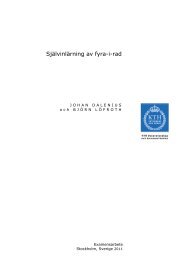Dr Faustus of Modern Physics - Department of Speech, Music and ...
Dr Faustus of Modern Physics - Department of Speech, Music and ...
Dr Faustus of Modern Physics - Department of Speech, Music and ...
You also want an ePaper? Increase the reach of your titles
YUMPU automatically turns print PDFs into web optimized ePapers that Google loves.
1.3. PLANCK: FATHER OF MODERN PHYSICS 11<br />
1.3 Planck: Father <strong>of</strong> <strong>Modern</strong> <strong>Physics</strong><br />
In Einstein, Bohr <strong>and</strong> the Great Debate about the Nature <strong>of</strong> Reality, Manjit<br />
Kumar concludes the Prologue by the following introduction <strong>of</strong> Max Planck:<br />
• In the 1890s some <strong>of</strong> Germany’s leading physicists were obsessively<br />
pursuing a problem that had long vexed them: what was the relationship<br />
between the temperature, the range <strong>of</strong> colors, <strong>and</strong> the intensity <strong>of</strong> light<br />
emitted by a hot iron poker? It seemed a trivial problem compared to the<br />
mystery <strong>of</strong> X-rays <strong>and</strong> radioactivity that had physicists rushing to their<br />
laboratories <strong>and</strong> reaching for their notebooks. But for a nation forged<br />
only in 1871, the quest for the solution to the hot iron poker, or what<br />
became known as the blackbody radiation problem, was intimately bound<br />
up with the need to give the German lighting industry a competitive edge<br />
against its British <strong>and</strong> American competitors. But try as they might,<br />
Germany’s finest physicists could not solve it. In 1896 they thought they<br />
had, only to find within a few short years that new experimental data<br />
proved that they had not. It was Max Planck who solved the blackbody<br />
problem, at a cost. The price was the quantum.<br />
The essence <strong>of</strong> the Faustian dilemma is expressed in The Dilemmas <strong>of</strong> an<br />
Upright Man [7] as follows:<br />
• Planck’s confidence in himself <strong>and</strong> his ideas increased in step with Prussia’s<br />
triumphs on the battlefield <strong>and</strong> with the new Reich’s rise to dominance<br />
among European nations. Although personally the mot modest<br />
<strong>of</strong> men, Planck identifed his own development so fully with Germany’s<br />
that the preservation <strong>of</strong> its cultural capital was inseparable from the<br />
preservation <strong>of</strong> personal values <strong>and</strong> pr<strong>of</strong>essional life. Over all these<br />
values stood the ideal <strong>of</strong> unity, which in the political sphere inspired the<br />
creation <strong>of</strong> the Wilhelmian empire <strong>and</strong> in the cultural sphere inpired<br />
belief in the interconnectednes <strong>of</strong> all respectable barnches <strong>of</strong> learning.<br />
Planck’s pride in imperial Germany <strong>and</strong> his commitment to the acaddemic<br />
ideal <strong>of</strong> unity <strong>of</strong> knowledge were the pillars on which he raised<br />
his science policy

















